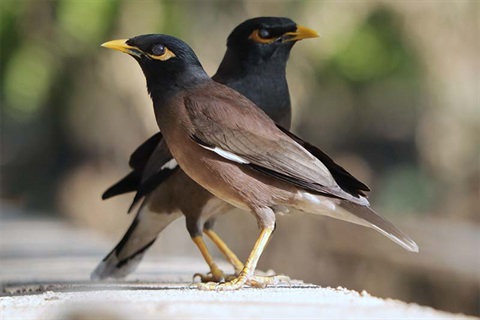Pests and invasive species

Indian Myna
The Indian or Common Myna is an introduced pest bird and their population is spreading rapidly.
For more information, please visit our Indian Myna page.
Foxes
Foxes are a serious pest animal that can cause damage to the environment, wildlife, and domestic animals. They can also carry diseases and parasites that can affect humans and pets. It is important to control their population and prevent their spread.
For more information, please visit our Foxes page.
Bees
There are over 1500 species of native bees in Australia. Bees play an important role in pollination and keeping our environments healthy.
Introduced bees include common species such as Honey or Bumble Bees.
If bees are on private land, contact a bee removalist for help.
For swarm collection, connect with a beekeeper: Aussie Apiarists Online
If bees are on Council land, please contact Public Health team on 9518 3555.
Wasps
There are many wasp species in Australia, ranging from native to introduced species. Wasps aren’t all dangerous, but some introduced wasp species such as the European Wasp, can sting and create nests.
To find out more information about how to identify and manage European wasps, please visit our page on Controlling European Wasps.
The best way to kill European Wasps is to destroy the nests. It is your responsibility to destroy wasp nests on your property. You can use professional pest controllers or you can do it yourself.
Mosquitoes
Most mosquito species develop quickly in warmer conditions, so the combination of heavy rains and increasing temperatures as we approach summer provides mozzies with the ideal conditions for their populations to boom.
Read more: Mosquitoes
Rodents
If you have mice or rats on your property, please see the RSPCA's information on controlling rats and mice.
Using poisons for control and management can cause significant risks for wildlife that are exposed to or consume rodents. Rodenticides should be avoided completely or only used for approved purposed.
Find more information on the Birdlife Australia website.
If you are experiencing ongoing issues with mice or rats on your neighbour's property, you can discuss with your neighbour or contact our Public Health Unit and an officer will visit your neighbour to advise them.
Weeds
Weeds are plants that invade and thrive in environments in which they do not naturally occur. These plants alter the natural balance in the local ecology and threaten biodiversity by competing with indigenous plants that are a valuable food source for native birds and fauna.
For more information on weeds and control techniques, visit our Weeds section.